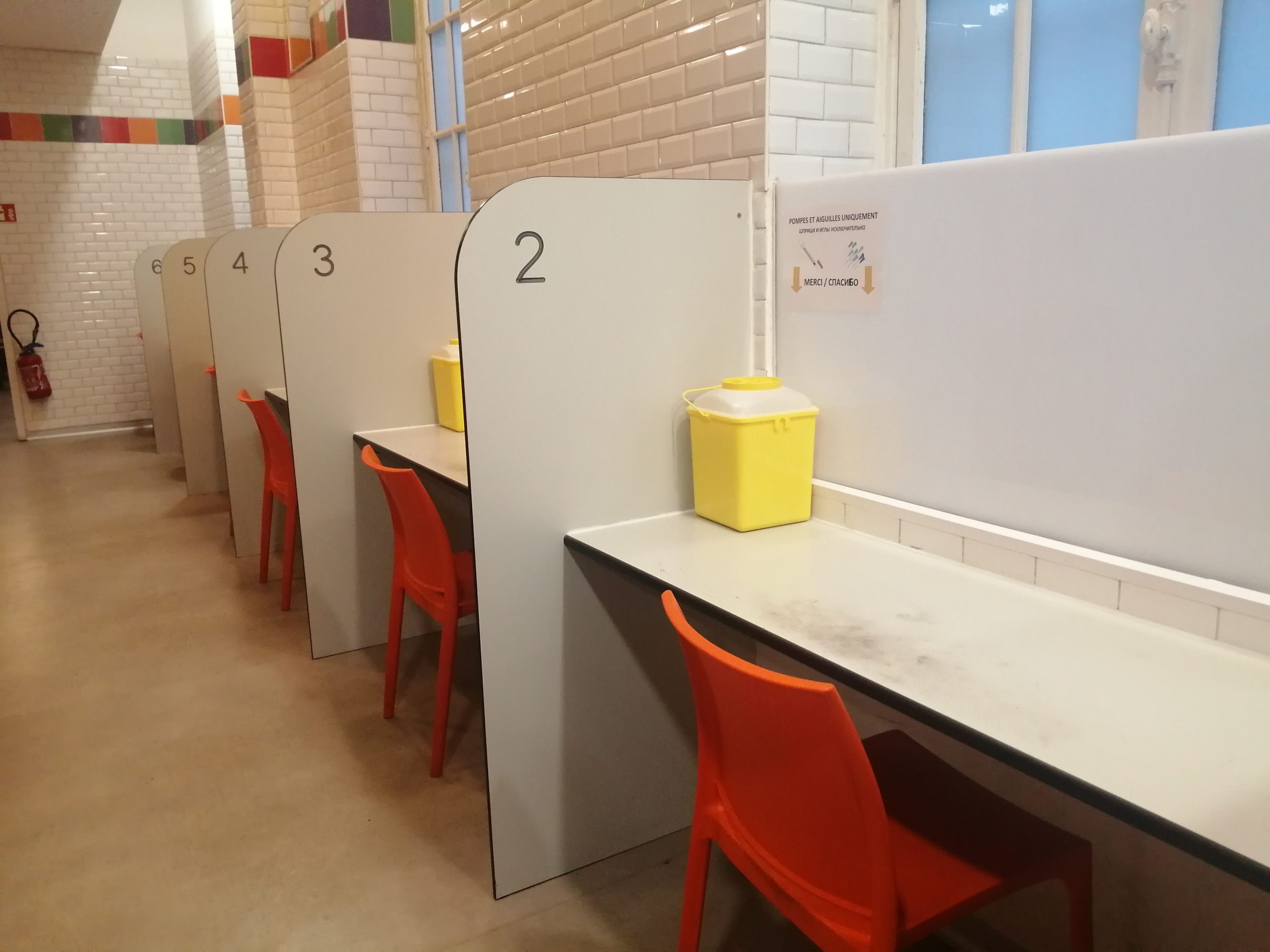 Paris, France, January 2020 – The European (Efus) and Belgian (FBPSU) Forums organised on 14 January a visit of the Paris Supervised Drug Consumption Room (SDCR) for a delegation representing the Belgian cities of Brussels, Liège and Molenbeek. The Paris SDCR is one of two established in France in late 2016 along with that of Strasbourg. In Belgium, there is one SDCR, which opened in Liège in September 2018.
Paris, France, January 2020 – The European (Efus) and Belgian (FBPSU) Forums organised on 14 January a visit of the Paris Supervised Drug Consumption Room (SDCR) for a delegation representing the Belgian cities of Brussels, Liège and Molenbeek. The Paris SDCR is one of two established in France in late 2016 along with that of Strasbourg. In Belgium, there is one SDCR, which opened in Liège in September 2018.
> A visit that builds on the recent SOLIDIFY project
Paris, Brussels and Liège were all partners in the SOLIDIFY European project on the local impact of SDCRs. Gathering a total of 12 partners (European cities as well as an association and the Barcelona Public Health Agency), it held its final conference in December in Lisbon (PT).
Started in January 2018, the project studied the implementation, sustainability and local impact of SDCRs in several European cities. Concluding the project, the partners unanimously agreed on three key principles:
- Drug policies must be pragmatic and seek to reduce the harms drug use causes to the health, social wellbeing and security of individuals, communities and society. They must be designed taking into account the needs on the ground, in each specific city or region.
- Supervised Drug Consumption Facilities (SDCFs) have proved to be efficient tools to locally improve public health and security. They help prevent drug-related deaths, reduce risks that lead to the transmission of blood borne viruses such as HIV and Hepatitis C, and reduce public disturbance. They are an effective means of reaching and staying in contact with highly marginalised populations, supporting their access to care and drug treatment. They do not encourage drug use.
- Local authorities have a key role to play in accompanying SDCFs and ensuring their effective management and acceptance in the local community. Together with civil society organisations, organisations and initiatives of people who use drugs, research institutions, governments and national and European agencies, they can create synergies that strengthen their efforts and increase impact.
> Less consumption in public and more security for drug users
When visiting the Paris SDCR, the delegation was able to see on the ground the soundness of these principles and the positive effect in terms of harm reduction for drug users. The SDCR also reduced local trafficking in a neighbourhood of Paris that was significantly affected.
Another key aspect concerns relationships with local residents who are divided between those who reject the facility and those who understand its purpose. Indeed, relationships with local residents were a key aspect of the SOLIDIFY project, and Gaïa confirmed that the structure’s sustainability depends on it to a certain degree.
Gaïa strives to dispel fears and bring local residents on board. In particular, it has good relations with an association of parents from the neighbouring district of Barbès as well as with other associations working in the neighbourhood (such as Médecins du Monde and Aides), the police and surrounding hospitals.
> 1,300 users in three years
Managed by the association Gaïa under the supervision of the French government’s Interministerial Mission Against Drug and Addictions (Mission interministérielle de lutte contre la drogue et les addictions, MILDECA) and funded by the national health service (Assurance Maladie) for a cost of three million euros, the Paris SDCR is located next to the Lariboisière Hospital. It has so far received some 1,300 users for a total of close to 185,000 drug consumption acts. This amounts to about 169 consumption acts per day, without counting other services apart from drug injection¹.
The SDCR has 12 injection and four inhalation booths. It also offers services such as HIV and viral hepatitis screening. It has a staff of 40, including seven nurses, a GP, a psychiatrist, social workers and educators, some of whom are former drug addicts.
According to Gaïa, the SDCR is also a “tool for harm reduction, awareness-raising and knowledge acquisition.” It demonstrates the positive aspects of the harm-reduction approach and contributes to advancing issues that were not considered as a priority before, such as less traditional ways of consuming.
> A facility that corresponds to the Paris City Hall’s long-term policy
The Paris City Hall has long been a supporter of the harm-reduction approach regarding drug consumption. It “supports and funds innovation and coordinates the various stakeholders involved in prevention and harm reduction in partnership with the central government.”
The Paris SDCR is “part of a network of services and structures providing medical and social support to drug users. It was decided to open it in order to provide medical and social care to users who were adrift in the neighbourhood. The opening of this facility was controversial politically and some local residents were opposed to it, but three years on the results are very positive and correspond to the initial objectives.”
> More field visits to come, in particular in Belgium
At the end of the visit, the Gaïa association, which already visited similar structures in Barcelona (ES), Essen (DE) and Strasbourg (FR), said they would like to do more field visits, in particular in Belgium.
> Website of the Gaia association / Paris SDCR
* The delegation gathered Catherine Moureaux, Mayor of Molenbeek Saint Jean; Sylvie Lahy, Chief of Staff, Police Zone, Prevention-Security; Morgane Lobjois, Chief of Staff of the Brussels Public Centre for Social Action; Sophie Dupaquet, Deputy Director of the Brussels crime prevention agency, BRAVVO asbl; Christine Defraigne, Deputy Mayor of Liège.
1. Journal Libération, 10/01/2020




